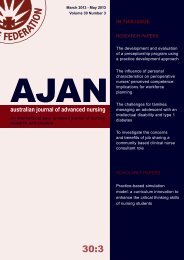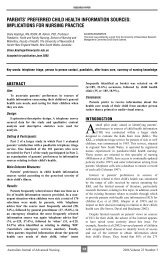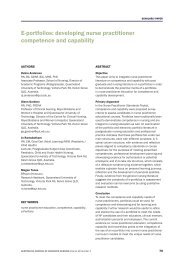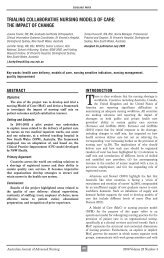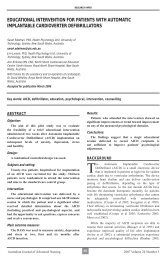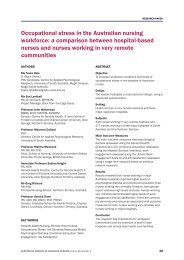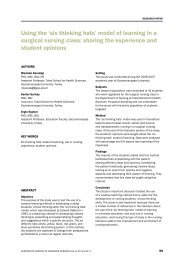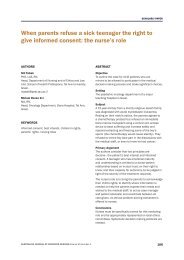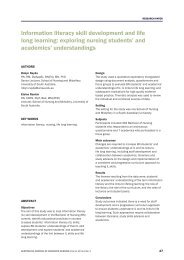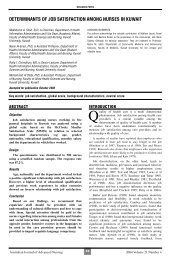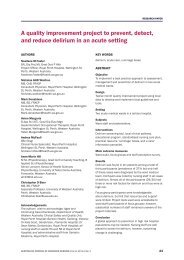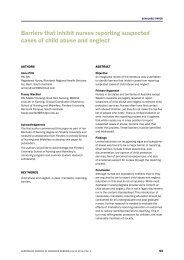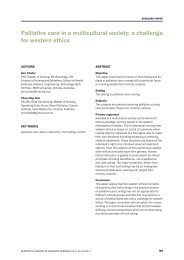australian journal of advanced nursing
australian journal of advanced nursing
australian journal of advanced nursing
You also want an ePaper? Increase the reach of your titles
YUMPU automatically turns print PDFs into web optimized ePapers that Google loves.
The field exercise appeared to change specific surge<br />
staff perceptions towards working during an influenza<br />
pandemic. A previous study on the willingness <strong>of</strong><br />
health workers to report to work during an influenza<br />
pandemic indicated that factors influencing reporting<br />
to work were: family preparedness, confidence in<br />
skills required, confidence to work in a different<br />
area knowledge or role, likelihood <strong>of</strong> event, the<br />
health services preparedness, and confidence in<br />
communicating with the public on the topic. By<br />
providing background information and then putting<br />
that training into action during an exercise, surge<br />
staff learnt about an influenza pandemic and some<br />
<strong>of</strong> its potential consequences. In addition they had<br />
the opportunity to work with people they would<br />
later work with during the pandemic response, they<br />
were able to actively carryout their role and practice<br />
communicating with people concerning an influenza<br />
pandemic. The evaluation also indicated many<br />
discussed the exercise and what might occur if a<br />
pandemic emerged with family and colleagues.<br />
A previous review was inconclusive on the role <strong>of</strong><br />
training interventions for health care workers in<br />
improving their knowledge and skills in disaster<br />
response (Williams et al 2008). The field exercise<br />
used in this study has shown that providing training<br />
and then putting the training into action is an<br />
appropriate strategy. While the training package<br />
requires some alteration it served as a good reference<br />
for the surge staff involved, but by itself appeared<br />
inadequate to effectively train surge staff alone.<br />
Limitations<br />
This study focused on the operational aspects<br />
<strong>of</strong> a public health containment response to an<br />
influenza pandemic only. While this study focused<br />
on deployment <strong>of</strong> senior nurses as operational<br />
public health surge personnel it is likely that other<br />
pr<strong>of</strong>essionals could also be utilised such as allied<br />
health pr<strong>of</strong>essionals, environmental health <strong>of</strong>ficers,<br />
and possibly even health students. The deployment <strong>of</strong><br />
environmental health <strong>of</strong>ficers was confirmed during<br />
the recent pandemic response.<br />
While this study provides some evidence that<br />
background information and exercises do assist<br />
RESEARCH PAPER<br />
in preparing staff to work during an influenza<br />
pandemic, the study was limited by small sample<br />
size, the response rate to the post‑exercise survey<br />
and the inability to match individual changes in<br />
perceptions.<br />
CONCLUSION<br />
Exercise deployment and evaluation confirmed that<br />
<strong>advanced</strong> nurses, such as clinical nurse consultants,<br />
nurse educators and nurse managers, working within<br />
a health authority are an appropriate surge workforce<br />
during public health emergencies. With appropriate<br />
support and training, <strong>advanced</strong> nurses can quickly<br />
develop the necessary skills to function during public<br />
health emergencies, including the containment<br />
response to pandemic influenza. Consideration<br />
needs to be given to reallocating senior nurses’<br />
other responsibilities during deployment to limit<br />
unnecessary additional stress.<br />
REFERENCES<br />
Agency for Healthcare Research and Quality, Department <strong>of</strong> Health<br />
and Human Services (US). 2005. Surge capacity and health system<br />
preparedness. [accessed 21.12.09]. Available from: URL: http://<br />
www.hsrnet.net/ahrq/surgecapacity/<br />
Australian Nurses Federation (ANF). 2005.Compentancy Standard<br />
for the Advanced Registered Nurse. Australian Nursing Federation:<br />
Melbourne. [assessed 04.01.10] http://www.anf.org.au/pdf/<br />
Competency_Standards_Adv_RN.pdf<br />
Australian Nursing and Midwifery Council (ANMC), 2006. National<br />
Competency Standards for the Registered Nurse. Available from:<br />
http://www.anmc.org.au/userfiles/file/RN%20Competency%20<br />
Standards%20August%202008%20(new%20format).pdf<br />
[Accessed 19.2.10].<br />
Balicer, R.D., Omer, S.B., Barnett, D.J., Everly, G.S. 2006. Local<br />
public health workers’ perceptions toward responding to an<br />
influenza pandemic. BMC Public Health, 6:99‑107.<br />
Barnett, D.J., Balicer, R.D., Thompson, C.B., Storey, D.J., Omer,<br />
S.B., Semon, N.L., Bayer, S., Cheek, L.V., Gateley, K.W., Lanza,<br />
K.M., Norbin, J.A., Slemp, C.C., Links, J.M. 2009. Assessment <strong>of</strong><br />
local Public Health workers’ willingness to respond to pandemic<br />
influenza through application <strong>of</strong> the extended parallel process<br />
model. PLoS ONE, 4:e6365.<br />
Barnett, D.J., Balicer, R.D, Blodgett D.W., Everly, G.S, Omer, S.B.,<br />
Parker, C.L., Links, J.M. 2005. Applying risk perception theory to<br />
public health workforce preparedness training. Journal <strong>of</strong> Public<br />
Health Management, Supp: s33‑s37.<br />
Bishop, J.F., Murnane, M.P., Owen, R.O. 2009. Australia’s winter<br />
with the 2009 Pandemic Influenza A (H1N1) virus. New England<br />
Journal <strong>of</strong> Medicine, 361(27): 2591‑2594.<br />
Brenner, P. 1984. From Novice to Expert: Excellence in clinical<br />
practice: Excellence and power in clinical <strong>nursing</strong> practice. Menlo<br />
park, California: Addison Wesley.<br />
AUSTRALIAN JOURNAL OF ADVANCED NURSING Volume 28 Number 3 52



